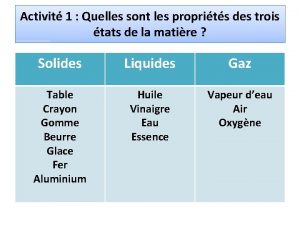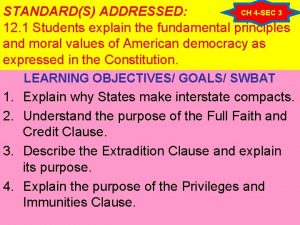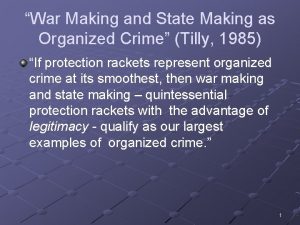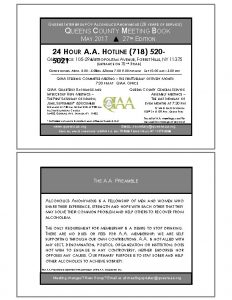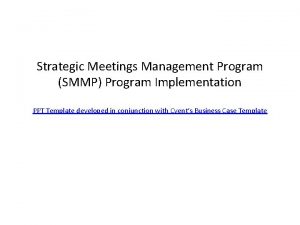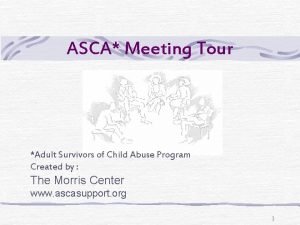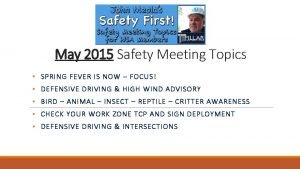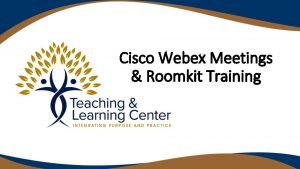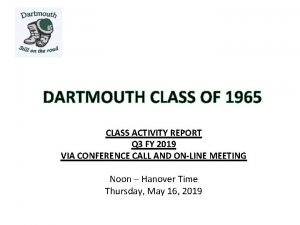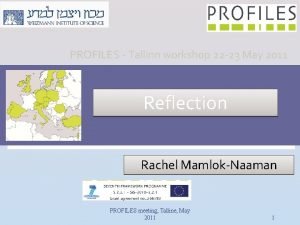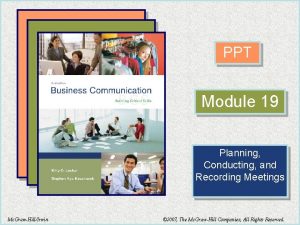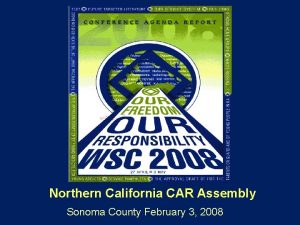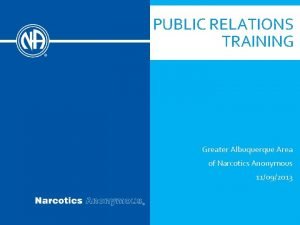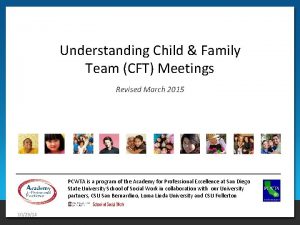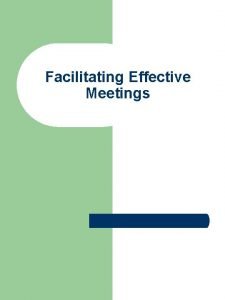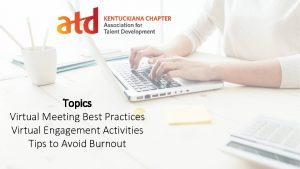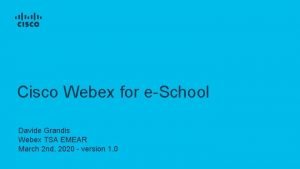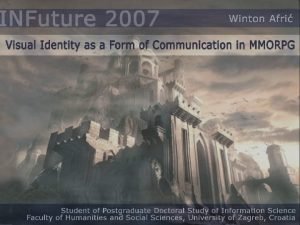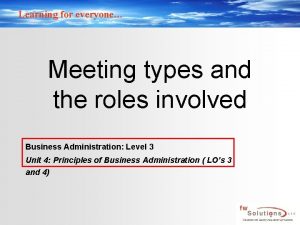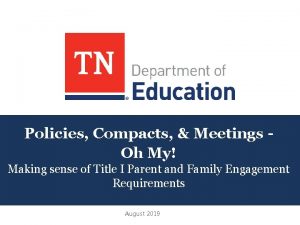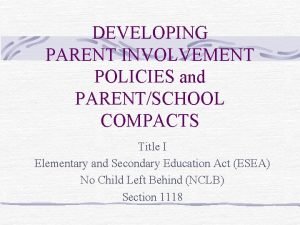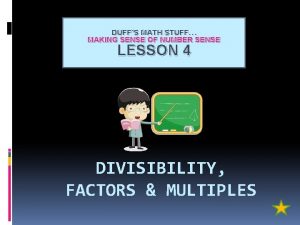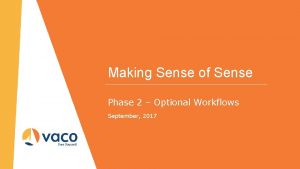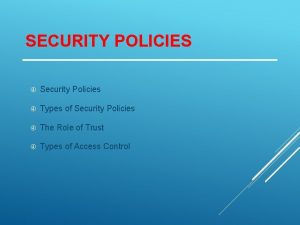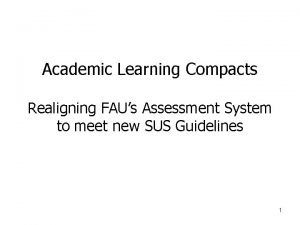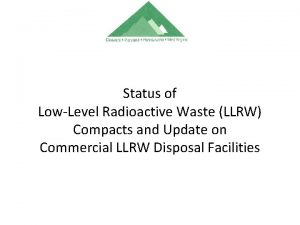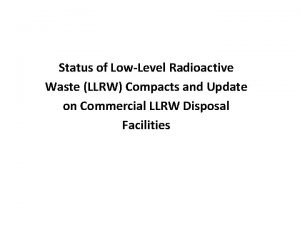Policies Compacts Meetings Oh My Making sense of


















































- Slides: 50

Policies, Compacts, & Meetings Oh My! Making sense of Title I Parent and Family Engagement Requirements August 2019

Brinn Obermiller Director of Titles IV, V, and Family Engagement Federal Programs and Oversight Brinn. Obermiller@tn. gov (615) 770 -1802

Agenda § Research § Definition of ESSA Parent and Family Engagement § District and School Requirements – – § § § Reservation of Funds Parent and Family Engagement Policy School-Parent Compact Annual Title I Meeting Allowable Use of Funds Monitoring Trends and Findings Guiding Principles Resources Questions & Discussion

Objectives Participants will: § Define parent and family engagement under ESSA. § Utilize research to understand the importance and benefits of parent and family engagement. § Identify district and school level parent and family engagement requirements under ESSA. § Identify allowable uses of Title I parent and family engagement funds. § Identify common monitoring trends and findings focused on parent and community engagement. § Identify guiding principles in parent and family engagement. § Explore resources focused on parent and family engagement. 4

Research 5

Research § Programs and interventions that engage families in supporting their children’s learning at home are linked to improved student achievement. § Family and community engagement that is linked to student learning has a greater effect on achievement than more general forms of involvement. § Effective connections embrace a philosophy of partnership where power is shared - the responsibility for children’s educational development is a collaborative effort among families, school staff, and community members. § Family participation in education is twice as predictive of students’ academic success as family socioeconomic status. 6

Research 7

Research § Families are more likely to be involved when they: – Understand why they should be involved. – Have confidence in making contributions. – Feel invited by the school and/or their children. Source: Hoover-Dempsey, K. , & Sandler, H. M. (1997). Why do parents become involved in their children’s education? Review of Educational Research, 67(1), 3 -42. 8

Definition 9

Definition Title I, Part A parent and family engagement is defined as the participation of parents and families in regular, two-way, and meaningful communication involving student academic learning and other school activities, ensuring that— § Families play an integral role in assisting their child’s learning; § Families are encouraged to be actively involved in their child’s education at school; § Families are full partners in their child’s education and are included in decision-making and on advisory committees to assist in the education of their child; and § Other activities are carried out, such as those described in ESSA Section 1116. 10

District Level Parent and Family Engagement Requirements 11

District Level Reservation of Funds § Each district receiving $500, 000 or more in Title I, part A funds shall reserve at least 1% of its allocation for schools to carry out parent and family engagement programming. – Districts receiving less than $500, 000 are not required to reserve funds, but they must still meet the other Title I Parent and Family Engagement requirements. § Not less than 90% of the funds reserved shall be distributed to Title I schools, with priority given to high need schools.

District Level Parent and Family Engagement § In accepting Title I, part A funding, a district must: – Develop with families a written parent and family engagement policy. – Evaluate the policy annually for content and effectiveness. – Build schools’ and families’ capacity for strong family engagement.

What is required in the district policy? § Title I, Part A, Section 1116 requires that the district parent and family engagement policy must describe, at a minimum, how the district will: – involve parents and family members in the joint development of the district plan; – provide the support necessary to assist schools in implementing effective family engagement activities to improve student performance; – conduct an annual evaluation of the effectiveness of the policy in improving the academic quality of Title I schools, including identifying barriers to greater participation by families (especially family members who are economically disadvantaged, disabled, have limited English proficiency, have limited literacy, or are a racial or ethnic minority), and use the findings to revise engagement policies and design strategies to support successful school and family interactions; and – involve families in school activities, which may include establishing an advisory board to develop, revise, and review the engagement policy. 14

School Level Parent and Family Engagement Requirements 15

School Level Parent and Family Engagement § Title I schools must: – Develop with families a written parent and family engagement policy. – Hold an annual meeting for families to explain the Title I program and the rights of parents to be involved. – Offer the annual meeting and other meetings at flexible times. – Develop a school-parent compact that outlines how parents, students, and school staff will share the responsibility for improving student achievement, and that describes how parents and teachers will communicate. 16

What is required in the school policy? § Title I, Part A, Section 1116 requires that the school parent and family engagement policy describe, at a minimum, how the school will: – convene an annual meeting to explain the school’s participation in the Title I program and the rights of families to be involved; – offer a flexible number of meetings; – include families in the planning, review, and improvement of the parent and family engagement policy and programs; 17

What is required in the school policy? § School-level policy requirements, continued: – provide timely information about family activities, a description and explanation of the school’s curriculum, forms of academic assessment, and expected achievement levels; and – jointly develop with families, a school-parent compact that outlines how families, school staff, and students will share the responsibility for improved student academic achievement and develop a partnership to help students achieve state standards. 18

What is required in the School-Parent Compact? § Title I, Part A, Section 1116 requires that schools shall: – jointly develop with parents a school-parent compact that outlines how parents, the entire school staff, and students will share the responsibility for improved student academic achievement and the means by which the school and parents will build and develop a partnership to help children achieve the state’s high standards. 19

What is required in the School-Parent Compact? § Such compact shall: – describe the school’s responsibility to provide high-quality curriculum and instruction in a supportive and effective learning environment that enables the children served under this part to meet the challenging state academic standards, and the ways in which each family will be responsible for supporting their children’s learning, volunteering in their child’s classroom; and participating, as appropriate, in decisions relating to the education of their children and positive use of extra curricular time; and 20

What is required in the School-Parent Compact? – address the importance of communication between teachers and parents on an ongoing basis through, at a minimum: • (A) parent-teacher conferences in elementary schools, at least annually, during which the compact shall be discussed as the compact relates to the individual child’s achievement; • (B) frequent reports to parents on their children’s progress; and • (C) reasonable access to staff, opportunities to volunteer and participate in their child’s class, and observation of classroom activities; and • (D) ensuring regular two-way, meaningful communication between family members and school staff, and, to the extent practicable, in a language that family members can understand. 21

What is required in the School-Parent Compact? Note: § While some schools previously utilized compacts that required signatures from parents, teachers, and students; this is not required in the federal law. Signing compacts is optional. § A compact is most useful as a communication tool to strengthen home-school relationships, not a contract to be used for corrective purposes. 22

What is required of the Annual Title I Meeting? § Each school receiving Title I, Part A funds is required to convene an annual meeting. § The purpose of this meeting is to inform parents and families of the school’s participation in the Title I program and the right of families to be involved. § The annual meeting for schoolwide programs should include all of the parents and families of a Title I, Part A school. § The annual meeting for targeted assistance programs should target and include only the families of the students identified to receive Title I, Part A services. 23

What is required of the Annual Title I Meeting? The annual meeting should address, at a minimum: § an explanation of the Title I program, including: – an explanation of the school’s curriculum, • information on the forms of academic assessment used to measure student progress, and • information on the proficiency levels students are expected to meet; – the Title I 1% set-aside (where applicable) and the families’ role in determining the distribution of funds; – the district and school Parent and Family Engagement Policy; – the School-Parent Compact; and – the right of families to be involved and how they can support their child’s learning. 24

Allowable Use of Funds 25

Allowable Use of Funds § District level parent and family engagement funds must be used for at least one of the following activities: – supporting schools in training school staff regarding engagement strategies; – supporting programs that reach families at home, in the community, and at school; – disseminating information on best practices focused on engagement, especially for increasing engagement of economically disadvantaged families; – providing subgrants to schools to collaborate with community-based organizations or businesses that have a track record of improving family engagement; and/or – engaging in any other activities that the district believes are appropriate in increasing engagement.

Allowable Use of Funds § District and school level Title I, Parent and Family Engagement Funds may be used for: – – – family engagement liaison(s) or coordinator(s), consultants, professional learning opportunities for staff, communication costs, home visits, stipends for staff to plan for or participate in Title I Parent and Family Engagement activities outside contract hours, – costs for family engagement activities including: • materials, transportation, childcare, translators and light refreshments. 27

Allowable Use of Funds - Food § It is allowable to use federal education funding for food for families during school-based events as long as there is a connection to a programmatic purpose and the cost is reasonable. § The following costs are allowable for families or students: – Nutritional snacks for children in child care while families are participating in family engagement activities, – Food necessary to conduct nutrition education programs for families, and – Food for family engagement activities in which refreshments are necessary to encourage participation or attendance by families (i. e. meeting is scheduled during a normal meal time) and thus meet program objectives. 28

Allowable Use of Funds - Food § Full meals for families or students are not allowable for these purposes under any circumstances. – The IRS defines a meal as, “A quantity of food that equals a full serving of breakfast, lunch, or dinner. ” – Refreshments may include, but are not limited to, “coffee, tea, milk, juice, soft drinks, ice cream, donuts, bagels, muffins, fruit, vegetable trays, cheese trays, pretzels, cookies and chips. ” 29

Discussion § How does your district utilize its family engagement funds? § How do your schools utilize their family engagement funds? 3 minutes End § Be prepared to share out! 30

Monitoring Trends and Findings 31

Monitoring Trends and Findings Common monitoring findings include: § Not maintaining proper documentation of required family engagement events and meetings (i. e. meeting invitations, sign-in sheets, agendas, meeting minutes, etc. ). § Not having adequate family representation/participation in required processes (i. e. Parent and Family Engagement Policy, School-Parent Compact, district/school improvement plan). – Parents who are also district or school employees do not qualify as family representatives for Title I and district/school improvement plan requirements.

Monitoring Trends and Findings Common monitoring findings include: § Not holding the required Annual Title I meeting or holding the meeting during another event. – If combining meetings, the Title I portion should be scheduled either before or after the other meeting. – The Title I meeting should have its own meeting invitation, sign-in sheet, agenda, and minutes. – The Annual Title I Meetings should not be held in conjunction with a PTA or PTO event.

Monitoring Trends and Findings § To avoid monitoring findings: – Ensure proper documentation is maintained for every family event. • Save all meeting and event invitations (flyers, emails, website blurbs, etc. ). • Create and save detailed agendas for all meetings and events. • Keep minutes of meetings and events to document discussions, ideas, and suggestions. 34

Monitoring Trends and Findings § To avoid monitoring findings: – Ensure proper documentation is maintain for every family event. • Create a standard sign in sheet for all meetings and events that includes space for participants’ name, position, and role; and the name and date of the meeting Event: School-Parent Compact Planning Meeting Date: December 6, 2107 Name Position Role Amy Smith Teacher 3 rd grade representative Mark Johnson Math Coach Support staff Jill Starks Assistant Principal School administration Sara Jones Afterschool Coordinator Community representative Bob Green 1 st grade parent Family representative 35

Guiding Principles 36

Core Beliefs Core Belief 1 Core Belief 2 Core Belief 3 Core Belief 4 • ALL parents have dreams for their children and want the best for them. • ALL parents have the capacity to support their children’s learning. • Families and school staff should be EQUAL partners. • The responsibility for building partnerships between school and homes rests primarily with SCHOOL staff, especially school leaders. Source: Henderson, A. T. , Mapp, K. L. , Johnson, V. R. , & Davies, D. (2007). Beyond the bake sale: The essential guide to family-school-partnerships. New York: The New Press.

Linked to Learning § All of the family engagement events and programs at your school should be linked to learning and should help families: – get a clear idea of what their children are learning and doing in class. – promote high standards for student work. – gain skills to help children at home. – understand what good teaching looks like. – discuss how to improve student progress. Source: Henderson, A. T. , Mapp, K. L. , Johnson, V. R. , & Davies, D. (2007). Beyond the bake sale: The essential guide to family-schoolpartnerships. New York: The New Press.

Standards for Family-School Partnerships § Tennessee’s Family Engagement Standards were enacted by Senate Bill No. 293 in 2009. These standards are based on the PTA’s National Standards for Family-School Partnerships and were formally adopted by the State Board of Education beginning in the 2010 -11 school year.

Resources 40

Parent and Family Engagement Policy Guide § The guide contains numerous tools to assist districts and schools in the development of the parent and family engagement policy. § Includes templates and samples for policies in both traditional and innovative formats. § Located in the Parent and Family Engagement Resources folder in TDOE Resources.

School-Parent Compact Toolkit § The toolkit outlines a step by step process for redesigning your school -parent compact. § Interactive toolkit with numerous tips and tools to make the process simple and efficient. § Located in the Parent and Family Engagement Resources folder in TDOE Resources. 42

Annual Title I Meeting Resources § Resources include: – Q & A document – Sample meeting protocols and agendas – Meeting flyer template – Meeting sign-in sheet template – Meeting evaluation form sample

Annual Title I Meeting Resources § The Annual Title I Meeting Power. Point Template can be utilized by districts and schools to ensure all federal requirements are met. § The template also contains several optional slides to help begin important discussions focused on parent and family engagement. § The template should be edited to meet your needs. § All resources are available in the Parent and Family Engagement Resources folder in TDOE Resources. 44

TDOE Family Engagement Resources § Developing a Written Parent and Family Engagement Policy: A Guide for Districts and Schools § Make the Connection: Creating an Effective School. Parent Compact § Annual Title I Meeting - Questions & Answers § Annual Title I Meeting - Presentation Template § Family-friendly Schools Walkthrough § Guidance on Using Federal Education Funds on Food § Family-Teacher Learning Conversations § Webinar Series: National Standards for Family-School Partnerships (e. Plan >TDOE Resources)

e. Plan – TDOE Resources

Parent and Family Engagement Resources § Parental Involvement: Title I, Part A Non-Regulatory Guidance § Dual Capacity-Building Framework for Family-School Partnerships § PTA National Standards for Family-School Partnerships § Joyce Epstein's Framework of Six Types of Parent Involvement § Beyond the Bake Sale: The Essential Guide to Family. School Partnerships § Engage Every Family: Five Simple Principles Reference to any resource, organization, activity, product, or service does not constitute or imply endorsement by the Tennessee Department of Education. 47

Parent and Family Engagement Resources § Flamboyan Foundation: Building Effective Family Engagement § NAFSCE: National Association for Family, School, and Community Engagement § Project Appleseed § Academic Development Institute and the Center on Innovation & Improvement: Handbook on Family & Community Engagement § National Center of Safe Supportive Learning Environments: Family-School-Community Partnerships § FREE Harvard Online Class: Introduction to Family Engagement in Education Reference to any resource, organization, activity, product, or service does not constitute or imply endorsement by the Tennessee Department of Education. 48

Questions & Discussion 49

Questions? Feedback? Brinn Obermiller Director of Title IV, V, and Family Engagement Brinn. Obermiller@tn. gov 615 -770 -1802 50
 John cleese meetings bloody meetings
John cleese meetings bloody meetings Meetings bloody meetings
Meetings bloody meetings Meetings bloody meetings 5 points
Meetings bloody meetings 5 points Narrow sense heritability vs broad sense heritability
Narrow sense heritability vs broad sense heritability Dominant genetic variance
Dominant genetic variance Features of sedimentary rocks
Features of sedimentary rocks Matire1
Matire1 Les solides pulvérisés
Les solides pulvérisés Chapter 4 section 3 interstate relations answer key
Chapter 4 section 3 interstate relations answer key A process that squeezes or compacts sediments
A process that squeezes or compacts sediments Indian gaming compacts
Indian gaming compacts Les solides compacts ont une forme propre
Les solides compacts ont une forme propre A process that squeezes, or compacts, sediments
A process that squeezes, or compacts, sediments Les solides compacts
Les solides compacts Making sense of discourse
Making sense of discourse War making and state making as organized crime
War making and state making as organized crime Making inferences
Making inferences Alcoholics anonymous queens
Alcoholics anonymous queens Eleet cryogenics
Eleet cryogenics Weight watchers meetings columbus ohio
Weight watchers meetings columbus ohio Pre-ind meeting
Pre-ind meeting Strategic meetings management strategy
Strategic meetings management strategy Asca meetings
Asca meetings Meaningful prayer before meeting
Meaningful prayer before meeting Meetings plus
Meetings plus Spring safety topics
Spring safety topics Na meetings in roseau
Na meetings in roseau Tsa meetings.webex
Tsa meetings.webex Webex meetings breakout rooms
Webex meetings breakout rooms Cascotland
Cascotland Dartmouth timetable of class meetings
Dartmouth timetable of class meetings Work reflections for meetings
Work reflections for meetings 4 p's of effective meetings
4 p's of effective meetings Pupil progress meetings
Pupil progress meetings Conducting effective meetings ppt
Conducting effective meetings ppt Sonoma county na meetings
Sonoma county na meetings Narcotics anonymous meetings albuquerque
Narcotics anonymous meetings albuquerque Aa meetings in corfu
Aa meetings in corfu Cft meetings
Cft meetings Ground rules for meetings
Ground rules for meetings Meeting rules
Meeting rules Lgbt coda meetings
Lgbt coda meetings Personal board
Personal board N meetings in one room
N meetings in one room Webex tsa
Webex tsa Virtual meetings
Virtual meetings Leon valley fire department
Leon valley fire department Chairing a meeting skills
Chairing a meeting skills Types of meetings
Types of meetings Parting thoughts for meetings
Parting thoughts for meetings Benefits of remote meetings
Benefits of remote meetings







